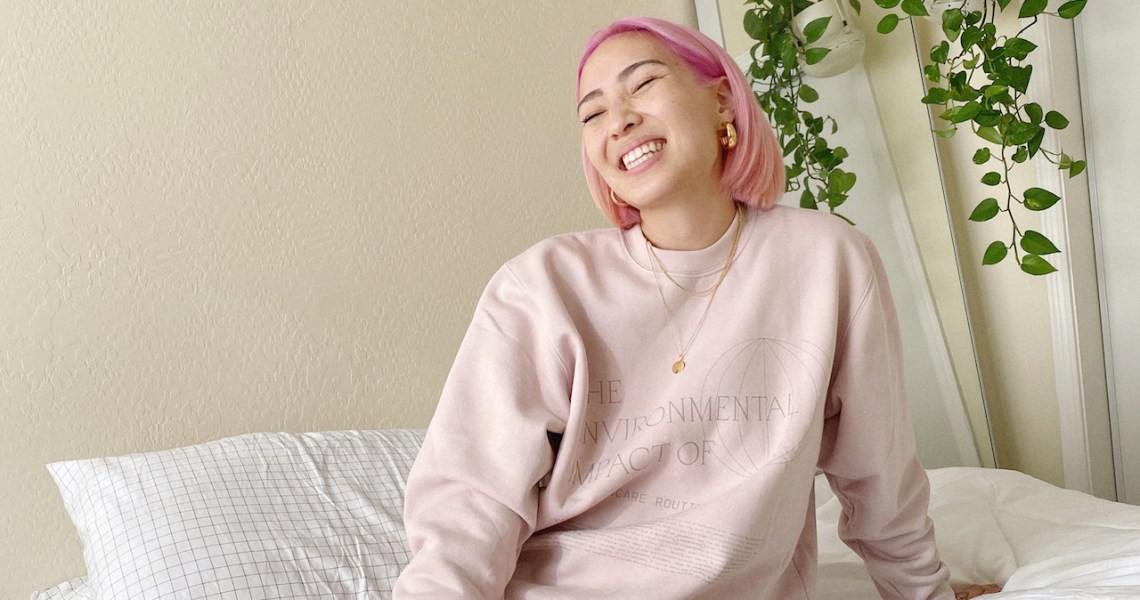Beauty brand merch is going sustainable ahead of Earth Day.
On Thursday, skin-care brand Versed launches its first cross-brand collab, with 3-year-old closed-loop fashion brand For Days. The two companies will be selling a limited-edition sweatshirt for $60 on their DTC sites, and an electric Versed truck will pick up recycled beauty products in L.A. as part of the promotion. Buying the shirt on either site will give customers access to the For Days closed-loop system; they will be able to return it for a credit for another product on For Days.
“We really believe in leading with education,” said Melanie Bender, president of Versed. “That’s why our first collaboration is really putting that front and center, with the waste and lifecycle of a beauty product being the major message around it. It’s really about the total footprint of the business and the product, and bringing a lot of integrity to how you’re measuring and communicating that. For Days is really just a shining example of that.”

Yvette Ward (courtesy photo)
Created in May 2019 by Katherine Power, the co-founder of fashion blog Who What Wear and current CEO of Who What Wear parent company Clique Brands, Versed joins a growing list of beauty brands launching merch products such as Glossier and Glow Recipe. Following a spa headband released in May 2020, the sweatshirt marks the second merch item for Versed.
Marketing for the partnership will be focused on influencer and brand content Instagram and TikTok, with the priority being “authentic and organic conversation,” said Bender. Influencers featured in promotions include stylist Yvette Ward, In Rainbows Mag founder Madison Chertow and designer Gabriela Masuda. On the platforms, the brands will document the trip of the Versed-branded truck through L.A. as it drops off sweatshirts to friends of the brand and collects empty products to recycle. It will also be stopping in public spots throughout the day so followers can drop off their empty products.
The collaboration also marks the first beauty partnership for For Days, which has previously collaborated with The RealReal.
“The last year has really accelerated people’s focus on sustainability, and what we find in our customer base is that they’re very curious. They like information, they want to learn. They’re really seeking better choices,” said Kristy Caylor, co-founder and CEO of For Days. “It’s a big, big shift from two years ago.”

Madison Chertow (courtesy photo)
Versed launched an annual sustainability report in February 2o2o, which outlines its drops in emissions and efforts to create more sustainable packaging.
“There is a lot of consumer excitement around recycling and waste that feels very hands-on,” said Bender, “but climate is really the lurking crisis that’s waiting to happen. And it’s a very human crisis.” Emissions reductions the brand has taken include creating more efficient shipping routes and moving more production into the U.S. On the packaging side, it has increased its use of post-consumer recycled materials.
Bender emphasized the importance of brands to remain transparent about their sustainability efforts. “I have very mixed feelings about marketing around sustainability,” she said. “There is demand there, but it’s very important to me that ‘sustainable’ does not become ‘clean.’ Sustainability cannot be a marketing claim, because there is a very specific meaning to that word and that principle. If we lose that, we really reduce our ability to create change.”
“It’s absolutely more expensive” to adopt these initiatives than follow a traditional manufacturing plan, said Bender. “But we believe in taking accountability for our business, and this is where the industry needs to be headed. There does need to be a carbon price that takes into account the true societal costs of carbon.”
As for consumer demand, both Bender and Caylor highlighted the importance that Gen Z places on sustainability in their purchase decisions. “Gen Z also buys a lot and they also like variety, [but they] are very sustainably-minded, so it’s an interesting convergence,” said Caylor. “Gen Z is very naturally and intuitively focused on sustainability, and I would say the younger millennials are, as well.”
Bender predicts that consumer demand will continue to push the industry toward becoming more sustainable. “Currently, consumers are buying first for results, then for price, then for clean, and then [to be more] sustainable. [The latter] will continue to gain importance.”




